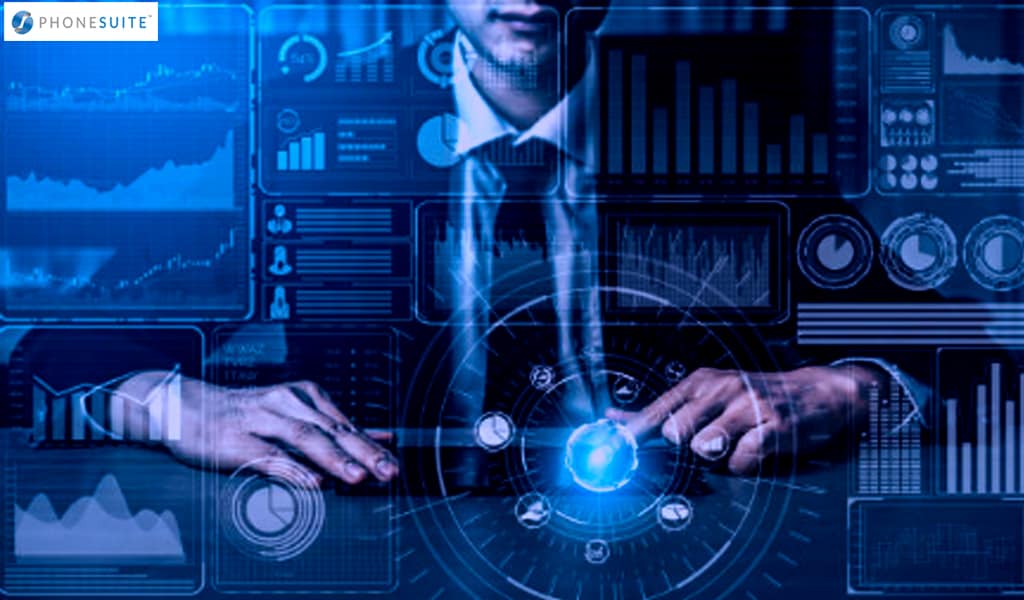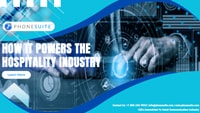Overview of How Modern Technology is Transforming the Hospitality Industry
The hospitality industry has always prided itself on providing personalized and memorable experiences to its guests. With the advent of modern technology, this goal is now achievable on a whole new level. From chatbots that can quickly help with customer inquiries to mobile check-ins that save valuable time, the digital transformation of the industry is making it easier than ever for hotels and resorts to cater to the needs and preferences of their guests.
Data analytics tools are helping hospitality professionals better understand their guests and anticipate their behavior, providing opportunities for impactful personalization. As the industry continues to evolve, it’s clear that technology will continue to play a crucial role in shaping guest experiences. Modern technology is transforming the hospitality industry in numerous ways, from enhancing guest experience to streamlining hotel operations.
Here are some of the ways in which modern technology is transforming the hospitality industry:
Mobile Technology:
With the increasing use of smartphones and mobile devices, mobile technology has become an essential tool for the hospitality industry. Hotels are leveraging mobile technology to offer guests a more personalized experience, such as mobile check-in and digital room keys, mobile concierge services, and mobile payments.
Artificial Intelligence (AI):
AI is transforming the hospitality industry by enabling hotels to automate various tasks and provide personalized services to guests. For example, chatbots powered by AI can provide instant responses to guest inquiries and provide recommendations based on guests’ preferences.
Internet of Things (IoT):
The IoT is transforming the hospitality industry by connecting various devices and systems to provide a seamless guest experience. For example, IoT-enabled devices such as smart thermostats, lighting systems, and voice-activated assistants can provide guests with more control over their environment.
Virtual Reality (VR) and Augmented Reality (AR):
VR and AR are transforming the hospitality industry by enabling hotels to offer immersive experiences to guests. For example, hotels can use VR to provide virtual tours of their properties, while AR can provide guests with information about local attractions and restaurants.
Big Data Analytics:
Big data analytics is transforming the hospitality industry by enabling hotels to analyze guest data to improve services and operations. For example, hotels can use guest data to offer personalized services and promotions based on guests’ preferences.
Cloud Computing:
Cloud computing is transforming the hospitality industry by enabling hotels to store and access data and applications from anywhere. This can help hotels streamline their operations, reduce costs, and improve guest experiences.
Benefits of Integrating Technologies Into Daily Operations
Technology has become an integral part of our daily lives. From smartphones to laptops, we rely on these devices for almost everything. So, why not incorporate these technological advancements into the workplace? Integrating technology into daily operations can greatly benefit businesses and their employees.
Integrating technologies into daily operations can bring numerous benefits to businesses, including:
Increased Efficiency:
Technology can automate and streamline routine tasks, reducing the time and effort required to perform them. This can free up employees to focus on higher-value tasks, increasing overall efficiency.
Improved Accuracy:
Technology can reduce errors in data entry and other routine tasks, improving the accuracy of business operations. This can lead to better decision-making and improved outcomes.
Enhanced Customer Experience:
Technology can enable businesses to offer personalized and interactive experiences to customers, such as mobile apps, chatbots, and virtual assistants. This can improve customer satisfaction and loyalty.
Better Data Management:
Technology can provide tools for collecting, storing, and analyzing data, enabling businesses to make better decisions and improve their operations. This can lead to better insights into customer behavior, market trends, and operational efficiency.
Cost Savings:
Technology can automate routine tasks, reduce manual labor, and lower operational costs. For example, a business can use cloud-based technology to reduce hardware costs and improve scalability.
Competitive Advantage:
By integrating the latest technologies into daily operations, businesses can gain a competitive advantage over their rivals. For example, businesses that offer mobile apps, digital payments, and other technology-enabled services can attract and retain customers who value these features.
Types of Software Solutions and Systems That Can Be Used to Streamline Processes
As businesses grow and expand, so do the processes and systems required to keep everything running smoothly. Thankfully, advancements in technology have made it easier than ever to streamline processes and boost efficiency. There are a variety of software solutions and systems available that can help with everything from accounting and project management to customer relationship management and human resources. There are numerous software solutions and systems that businesses can use to streamline processes, improve efficiency, and reduce costs.
Here are some of the most common types:
Customer Relationship Management (CRM) Systems:
CRM systems help businesses manage customer interactions and data, providing a central repository for customer information. This can help businesses improve customer service, increase customer satisfaction, and personalize marketing and sales efforts.
Enterprise Resource Planning (ERP) Systems:
ERP systems integrate various business functions such as accounting, human resources, supply chain management, and customer service into a single system. This can help businesses streamline processes, improve data accuracy, and enhance collaboration across teams.
Business Intelligence (BI) Systems:
BI systems enable businesses to analyze and visualize data to make informed decisions. They can provide insights into customer behavior, market trends, and operational efficiency, helping businesses identify areas for improvement and capitalize on opportunities.
Project Management Systems:
Project management systems help businesses plan, execute, and track projects, ensuring that they are completed on time and within budget. They can improve team collaboration, provide visibility into project status, and help managers allocate resources effectively.
Workflow Management Systems:
Workflow management systems help businesses automate and optimize workflows, reducing manual labor and improving efficiency. They can ensure that tasks are completed in the correct order and by the right people, reducing errors and delays.
Human Resource Management (HRM) Systems:
HRM systems help businesses manage employee data and processes such as payroll, benefits, and performance management. They can improve efficiency, reduce errors, and help businesses comply with labor laws and regulations.
Using Digital Tools
The use of digital tools for customer engagement, communication, and data analysis has revolutionized the way businesses interact with their target audience. These tools provide a plethora of advantages that make them indispensable for any modern business. By using digital tools, businesses can engage customers on multiple platforms, including social media, chatbots, email, and SMS.
This enables them to build a strong relationship with customers and foster brand loyalty. Digital tools offer real-time communication, which allows businesses to respond promptly to customer inquiries, complaints, and feedback. This helps them to improve customer satisfaction and retention.
Additionally, digital tools provide valuable data that businesses can analyze to improve their marketing strategies, product development, and overall business performance. With these benefits, it’s no wonder that businesses are making the shift towards digital tools for customer engagement, communication, and data analysis.
Here are some of the most common digital tools used for customer engagement, communication, and data analysis:
Social Media:
Social media platforms such as Facebook, Twitter, Instagram, and LinkedIn provide businesses with a way to engage with customers, promote their brand, and build relationships with their audience. Social media also offers a way for businesses to track customer sentiment and gather feedback.
Email Marketing:
Email marketing enables businesses to communicate directly with customers and prospects through targeted email campaigns. It can be used to promote products, offer discounts, and provide valuable content to customers.
Chatbots:
Chatbots are computer programs that simulate human conversation, enabling businesses to provide 24/7 customer support and answer customer questions in real-time. Chatbots can also be used to gather customer data and provide personalized recommendations.
Business Intelligence (BI) Systems:
BI systems enable businesses to analyze and visualize data to make informed decisions. They can provide insights into customer behavior, market trends, and operational efficiency, helping businesses identify areas for improvement and capitalize on opportunities.
Web Analytics:
Web analytics tools such as Google Analytics provide businesses with insights into website traffic, user behavior, and engagement. This can help businesses optimize their website and improve the user experience.
How Cloud-Based Services Are Helping Hotels Improve Customer Experience
As the hospitality industry grows increasingly competitive, hotels are turning to cloud-based services to streamline their operations and enhance the customer experience. By using these services, hotels can automate routine tasks such as booking management, inventory tracking, and payment processing, freeing up staff to focus on personalizing the guest experience. Additionally, cloud-based services provide hotels with valuable insight into customer behavior, allowing them to tailor their services to meet individual needs and preferences.
From mobile check-in to personalized recommendations, cloud-based services are revolutionizing the way hotels interact with their guests, creating a more seamless and enjoyable experience for all involved.
Examples of Successful IT Implementations
The successes that have been witnessed in this space have been tremendous, and the impact felt across the board. The hospitality industry has seen many successful IT implementations in recent years.
Here are some examples:
Marriott International’s Mobile App:
Marriott’s mobile app enables guests to check-in, check-out, request room upgrades, and access information about the hotel’s amenities and services. The app has been a major success, with more than 28 million downloads since its launch.
Four Seasons Hotels and Resorts’ Chat Service:
Four Seasons’ chat service enables guests to communicate with hotel staff through a messaging platform, providing 24/7 customer support and enhancing the guest experience. The chat service has been praised for its efficiency and effectiveness.
Hilton Worldwide’s Digital Key:
Hilton’s Digital Key allows guests to use their mobile devices as room keys, eliminating the need for physical keys or key cards. The system has been well-received by guests and has helped to reduce costs associated with lost or damaged key cards.
Disney Parks’ MagicBand:
Disney’s MagicBand is a wearable device that serves as a park ticket, room key, and payment method, as well as providing access to personalized experiences and recommendations. The system has been a major success, with more than 40 million bands distributed since its launch.
AccorHotels’ AccorLocal App:
AccorHotels’ AccorLocal app enables guests to book services such as laundry, food delivery, and fitness classes, as well as providing recommendations for local attractions and experiences. The app has been praised for its convenience and flexibility.
Partner With Us!
By partnering with PhoneSuite Voiceware, you can put your hospitality business in the best possible position to succeed. As the leading provider of voice, messaging, and collaboration solutions, they offer products and services that can benefit end-users and vastly improve customer experience. With a full suite of services tailored to meet specific hospitality needs – from cloud-hosted PBX systems to all-in-one hotel phones – you will be well-equipped to keep your guests happy, secure, informed and connected.
Leverage PhoneSuite’s expert team and superior technology today to take your business to new heights.




